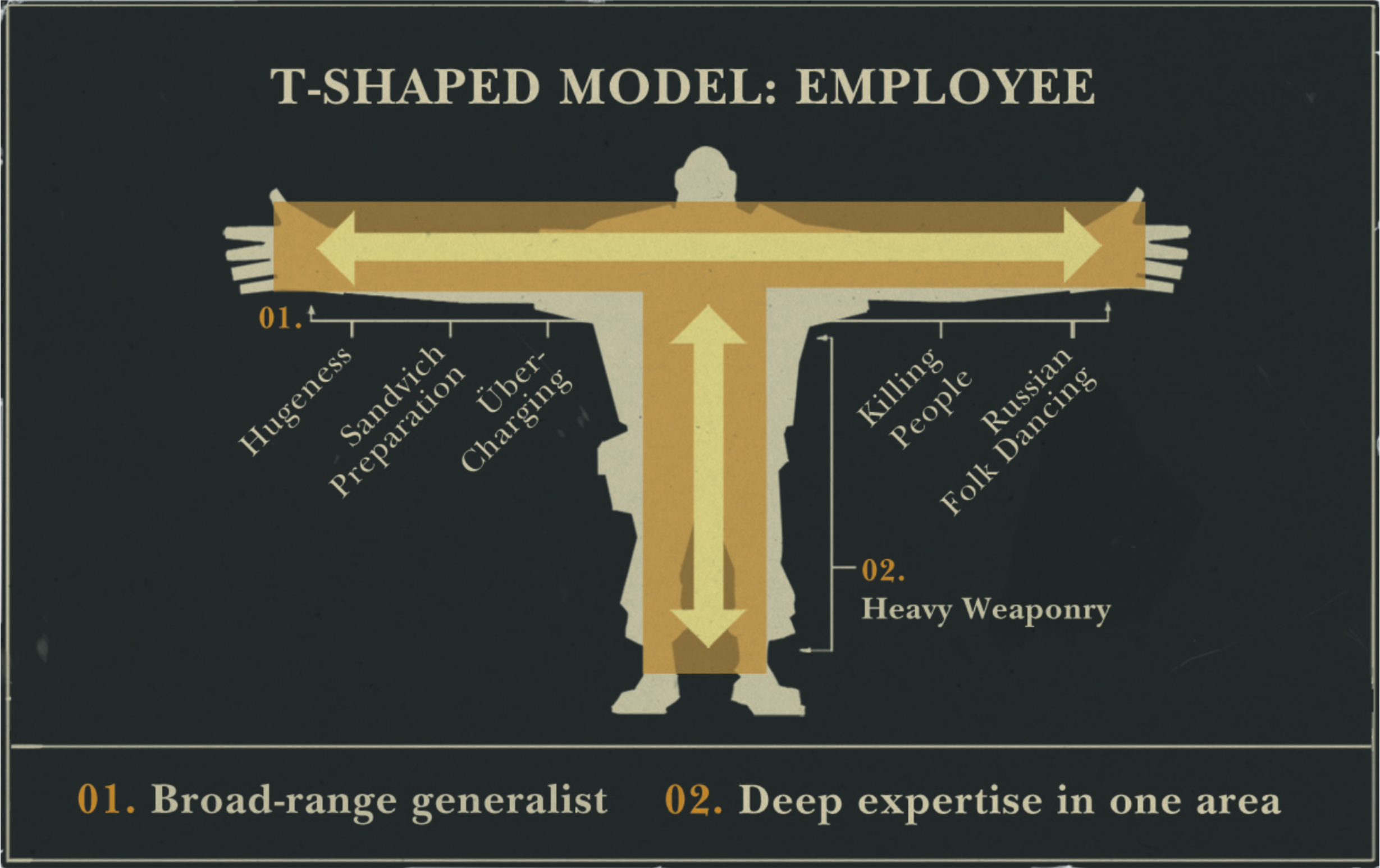Earning XP wisely
Lessons from video games and How Will You Measure Your Life? (chapter 7) by Clayton M. Christensen
One of the valuable lessons roleplaying games like Skyrim have to teach is that you have some control over what kind of person you are. In Skyrim, when you practice a skill, you earn experience points (XP) in that skill. Earn enough experience points and you level up that skill, making you better at it.
There’s more to this than “practice makes perfect”. Given a finite lifespan, each skill you improve has an opportunity cost. Choosing to solve a problem one way instead of another changes who you are a little bit, because you gain experience in the skills you use. Like water slowly carving a riverbed, your day-to-day choices shape who you are as a person; every time you do something, it gets a little bit easier to do that again next time, whether those choices are good or bad. This is illustrated by…1

Once upon a time, there was a company named Dell. Dell was one of the best computer manufacturers in the whole world. In the early 1990s, as the internet was just becoming a thing, Dell realized they could offer computers more cheaply than established competitors by selling them through the internet instead of having a storefront. What’s more, they sold customized computers: on their website you could pick which parts you wanted, and they would build the PC for you and ship it to you within 48 hours – a marvel!
One of the reasons Dell’s computers were so cheap was because they got chips from a Taiwanese company called Asus. Asus made very good chips at a very low price. One day Asus said to Dell, “We think we can save you even more money. We can assemble our chips into motherboards for 20% cheaper than you’re doing it. Let us make the motherboards, so you can focus on what you’re good at.”
The managers at Dell thought about it. Asus had been very reliable at making chips, and there was reason to believe they’d be good at making motherboards. What’s more, the change would look really good for Dell’s financials: once they got rid of their motherboard manufacturing division, the company would be making more money off fewer assets, so its profitability metrics would go way up. So Dell agreed – they outsourced their motherboards to Asus. Their stock price went way up.
Some time later, Asus said to Dell, “How do you like the motherboards we’re making you?”
“They are excellent motherboards,” said Dell.
“We’re good for more than just fabricating motherboards,” said Asus. “We could assemble the whole computer for you. And we can do it for 20% cheaper than what you’re paying now.”
The managers at Dell thought about it. Asus had been doing a very good job with the motherboards. And the same argument from last time held true. Outsourcing computer assembly to Asus would let Dell write off all of their computer assembly assets; Dell could make more money with fewer assets, which Wall Street would love. Dell agreed. Their stock price went up even more.
This happened several more times. “Hey Dell, since all of the parts are coming to our factories anyway, why don’t you let us manage the supply chain? It will save you money, and you can write off those assets.” “Okay, Asus.”
“Hey Dell, why don’t you let us design the computers, too?” “Sounds good, Asus.”
“Hey Dell, how about we ship computers directly to your customers for you? We can take care of customer service, too.” “Awesome. Go for it.”
Now Dell was making a ton of money off very few assets at all. Their stock price was enormous. All of Dell’s executives were very happy.
Then, one day in 2005, Asus said “Good news, everyone! Now you can buy your very own Asus computers! They’re a lot like Dell computers – in fact, they’re exactly like Dell computers – only cheaper!” And Dell executives realized they had erred.
Every step along the way had made sense. Each decision had achieved its goal. But the result of that optimization process was a hollowed-out company. All they did was make money by providing branding to Asus…until Asus decided to take over that too.

Amazingly, Dell recovered. Michael Dell and associates paid $24.9 billion dollars to take Dell off the stock market and make some big changes; now they’re publicly traded again as a general-technology company. But this story shows us the downside of outsourcing: when you pay someone else to do something for you, you forfeit the XP you would have earned doing it yourself.
Does this mean you should never pay someone else to handle something for you? Obviously not. You just need to be deliberate about which skills you’re practicing and which ones you’re skipping over.
I think every person should have a few primary skills they’re great at, a larger number of secondary skills they’re OK at, and an unbounded number of skills they’re content to ignore.2 Valve (creator of the Steam Store that dominates PC gaming) calls this being a T-shaped person.3

Primary skills
Everyone should have a few things that they’re really good at. Ideally, one or more of these things will be related to your job, but even if not, being really good at something is good for your self-esteem and helpful for forming relationships. Your primary skills should be the ones that matter the most to you – the ones you want to push toward mastery. Never outsource a primary skill.
Which skills you prioritize says a lot about who you are. Your primary skills are not the skills you say you care most about – they are the skills you actually invest time and energy into.
If you’re married, being a good spouse should be one of your primary skills. If you’re a parent, parenting should be one of your primary skills. Christensen opines that if you have opinions about how you want your children to turn out, your best chance to influence them is when they’re young, and the way you influence them is by spending time with them. The extent to which you outsource their education is the extent to which other people are raising your kids.
Part of being a parent is helping your kids develop their own skills. Christensen warns that keeping kids too busy with extracurricular activities can prevent them from developing primary skills. If kids are constantly being rushed from one activity to another, they will never have the opportunity to focus on one thing and get really good at it. Having at least one thing that they’re really good at will do them a lot more good than one more elective. To get that high-level learning, they need independence and time to focus.
Secondary skills
Focusing on your primary skills exclusively turns you into a two-dimensional character with no depth. It also makes it difficult to collaborate with others when the one thing people are consulting you for is the only thing you know anything about. So in addition to your primary skills, it’s a good idea to have a little bit of skill in a bunch of different areas.
To some extent, this is the reason why liberal arts colleges want everyone to know history, math, and things like that. Having a shared collection of things that are common knowledge is valuable, but don’t underestimate the value of knowing weird, arcane things nobody else has ever heard of. Parties are a lot more fun with someone who can wax rhapsodic about the extremophilic bacteria that live in volcanic vents.
One area where a little bit of skill will do you a lot of good is being able to fix things around the house. The author fondly reminisces how his mother was too cash-strapped to buy him new socks and too busy to repair his old ones, so she showed him how to repair one sock, handed him her tools, and told him to go nuts. After several such lessons, he gained the skill and confidence to repair his own clothing. More than that, he learned to solve his own problems in other areas of life.
This is part of why I wrote my series on hardening your computer infrastructure. Whenever you’re spending a lot of time with something, there’s value in learning how it works, so you can use it better and repair it if it breaks. Wiring up your own backup system isn’t as convenient as getting an all-in-one solution that does everything for you, but it’s within the grasp of a tech-literate person, and when you’re done you’ll have a cost-effective, resilient system that you understand and can fix when the world changes and something breaks.
One of the main reasons secondary skills are so valuable is because they connect you with other people. Nobody has every home repair skill. We don’t have to; that’s what friends are for. When you learn a useful skill (like cooking, or setting up a password vault), offer the use of that skill to your friends. Your relationships will get stronger, and they may reciprocate. Being in a group of friends who help each other is one of life’s great joys.
Lots of people these days feel alone and powerless. You can fight that feeling, for yourself and your friends, by sharing skills. Over a dozen times, I’ve moved to a new city and started a new group of friends, and I can tell you that the most reliable way to make friends is to provide something that people will come back for. I have many treasured friendships that crystallized around Dungeons & Dragons campaigns that I ran. Right now my wife and I serve a weekly meal to a group of our close friends; now those friends are stepping up to help each other through some very trying times in a truly inspiring way.
So if you’re feeling helpless and alone, go buy some frozen pizza, stick it in the oven, and invite some friends over. Start a group chat with some people you like and organize a game night. Talk with your friends about practical needs you have and figure out ways to help each other. Sharing skills is how you build the kinds of communities you want to live in.
-
The story of Dell and Asus is told by Christensen in chapter 7 of How Will You Measure Your Life? I haven’t been able to independently confirm it, so I’m retelling it here in a more fairy-tale style. ↩
-
This is me talking, not Christensen. ↩
-
See Valve’s employee handbook, page 47. ↩
